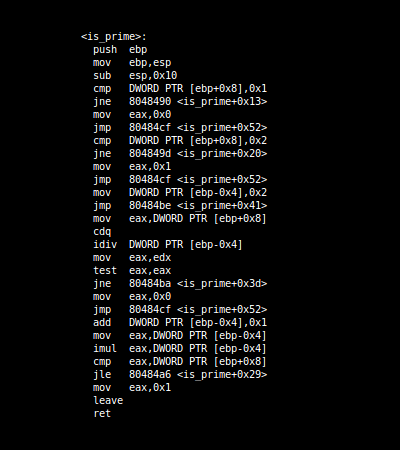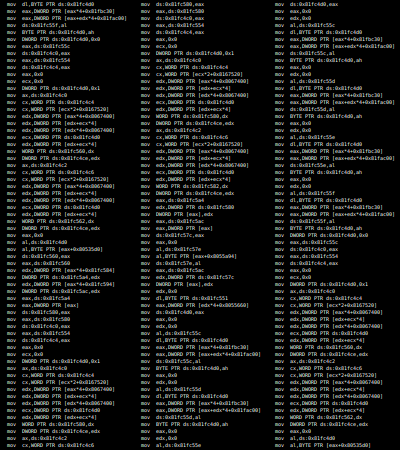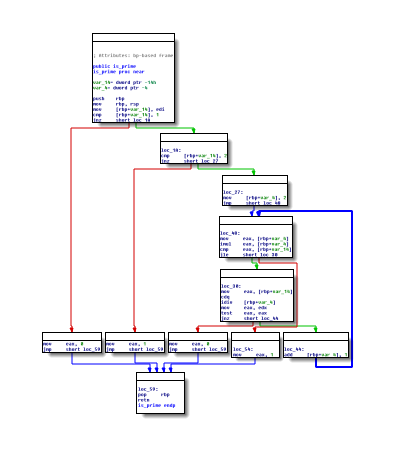___ ___ ___ ___ ___ ___ ___ ___ ___
/\ \ /\ \ ___ /\__\ /\ \ /\__\ /\__\ /\ \ /\ \ /\ \ .
|::\ \ /::\ \ /\ \ /:/ _/_ \:\ \ /:/ _/_ /:/ / /::\ \ ___ /::\ \ /::\ \ .
|:::\ \:/\:\ \ \:\ \:/ /\__\ \:\ \:/ /\ \:/ / /:/\:\ \/\__\:/\:\ \:/\:\__\ .
__|:|\:\ \ \:\ \ \:\ \ /:/ / \:\ \ /::\ \ / _:/ /::\ \/ // \:\ \ /:/ /
/::::|_\:\__\/ \:\__\ \:\__\:/ / \ \:\__\:/\:\__\/ /\__\:/\:\__\_//__/ \:\__\:/__/___
\:\~~\ \/__/\ /:/ / |:| |/ /\ \ /:/ // /:/ /\ /:/ // \/__/ \\ \ /:/ /::::/ /
\:\ \ \:\ /:/ / \|:| |__/\:\ /:/ // /:/ / /:/ //__/:/\:\ \\ /:/ //~~/~~~~
\:\ \ \:\/:/ /\__|:|__| \ \:\/:/ //_/:/ /:\/:/ /:\ \/__\:\ \\/:/ /:\~~\ .
\:\__\ \::/ /\::::/__/:\__\ \::/ / /:/ / \::/ / \:\__\ \:\__\:/ / \:\__\ .
\/__/ \/__/ ~~~~ \/__/ \/__/ \/__/ \/__/ \/__/ \/__/ __/ \/__/ 2
M/o/Vfuscator2
github.com/xoreaxeaxeax/movfuscator :: the single instruction C compiler
chris domas @xoreaxeaxeax
The M/o/Vfuscator (short 'o', sounds like "mobfuscator") compiles programs into "mov" instructions, and only "mov" instructions. Arithmetic, comparisons, jumps, function calls, and everything else a program needs are all performed through mov operations; there is no self-modifying code, no transport-triggered calculation, and no other form of non-mov cheating.
The basic effects of the process can be seen in overview, which illustates compiling a simple prime number function with gcc and the M/o/Vfuscator.
Assembly:
| GCC | M/o/Vfuscator |
|---|---|
 |
 |
Control flow graphs:
| GCC | M/o/Vfuscator |
|---|---|
 |
 |
In action:
| movcc prime.c -o prime |
|---|
 |
Of course, as a complete C compiler, it is not limited to simple programs:
| movcc nibbles.c -o nibbles -lncurses |
|---|
 |
The compiler currently targets the C programming language and x86 processor architecture, but is easily adaptable to other languages and architectures.
The M/o/Vfuscator uses LCC as the compiler frontend. The included build script will automatically download LCC, configure it for the mov backend, and build the M/o/Vfuscator tool.
If you are building on a 64 bit system, ensure that you have a 32 bit libc available (for example, 'apt-get install libc6-dev-i386' or 'yum install glibc-devel.i686').
git clone https://github.com/xoreaxeaxeax/movfuscator
cd movfuscator
./build.sh
sudo ./install.sh
If you have trouble building LCC, you can get more details on the LCC build process at: https://drh.github.io/lcc/current/doc/install.html
Check that the build was successful with the check script. This will automatically download an open source AES implementation, compile it to mov instructions, objdump the result, and run the program.
./check.sh
Compile programs as you would with any traditional C compiler:
movcc example.c -o example
Flags are passed to the compiler proper via -Wfflag, e.g. -Wf--no-mov-id
--mov-id
Add reference instructions for each basic block to assist debugging.
--no-mov-id
Do not add reference instructions. This is the default.
--mov-flow
Use mov instructions in implementing control flow. This is the default.
--no-mov-flow
Use jmp instructions in implementing control flow. This will substantially
speed up execution in larger projects. If using floating point operations
with this flag, link to softfloat*_cf.o instead of the fully obfuscated
libraries.
--mov-extern
Use mov instructions to implement external function calls. This is the
default.
--no-mov-extern
Use jmp instructions to implement external function calls. This is useful for
debugging.
--mov-loop
Use mov instructions to implement the primary execution loop. This is the
default.
--no-mov-loop
Use jmp instructions to implement the primary execution loop. This is useful
for debugging.
--crt0
Build the M/o/Vfuscator crt0 library (_start routines).
--crtf
Build the M/o/Vfuscator crtf library (primary execution loop routines).
--crtd
Build the M/o/Vfuscator crtd library (data tables).
--crt
Same as --crt0 --crtf --crtd.
-
The M/o/Vfuscator contains a complete mov-only floating point emulator. Since it is approximately 500,000 instructions, you must explicitly link to it if you need it. Use the smaller softfloat32.o if you only use floats, softfloat64.o if you need floats and doubles, and softfloatfull.o for a full IEEE floating point emulator.
movcc your_code.c movfuscator/lib/softfloat32.o
-
Due to the lookup tables used for arithmetic, the symbol tables in the compiled binary can be extremely large. Stripping symbols with the -s flag can cut the final binary size by half.
movcc example.c -s
-
You may occassionally run into ABI conflicts when calling into libraries compiled with other compilers. These are relatively rare, but do occassionally pop up. Watch out for:
-
Passing a pointer to a callback function into a library. The M/o/Vfuscator will clobber registers the library was expecting to have preserved.
-
Using the long long type. The M/o/Vfuscator uses a 32 bit long long; your library may be expecting 64 bits.
-
Such ABI issues are relatively rare; they can be roughly fixed with some coding caution, or more robustly fixed by recompiling your libraries with the M/o/Vfuscator.
-
-
LCC is a C89 compiler. If you try to compile C99 code, you will get errors. Don't use C99 features like bool, for (int ...), etc. Don't declare variables in the middle of blocks.
-
To generate code correctly, the M/o/Vfuscator must be able to determine when a call is being made to a shared library. If a function is used before it is declared, this determination may be incorrect. If your executable hangs, it may be because a function prototype was missing.
-
LCC strongly enforces type and const rules. You may not be able to compile code with unsafe type or const conversions, unless you explicitly cast for it.
-
These are by far the most common causes of the M/o/Vfuscator "breaking". Make sure you handle these before you try to compile your code.
-
Calls to external functions (printf, etc) through function pointers are not yet implemented. That is,
getchar()works, but
int (*f)(void)=getchar; f();does not.
If you need to do this, wrap the function internally:
int g(void) { return getchar(); } int (*f)(void)=g; f();
-
When calling into libraries compiled with other compilers, an occassional non-mov instruction is necessary. This can be fixed by compiling all of your libraries with the M/o/Vfuscator. To be clear, this is not a limitation of the M/o/Vfuscator, or a violation of mov Turing-completeness - non-mov instructions are only necessary to accommodate non-mov calling conventions. If you do not recompile your libraries, the non-mov instructions are as follows:
-
A single jmp instruction at the end of the program is used to dispatch the program's external functions. If you wish to avoid this jmp instruction to have a truly mov only program, compile with --no-mov-extern, and avoid calling into shared libraries. If you still need an external function, recompile the library with the M/o/Vfuscator, and statically link it to your program.
-
An fstp instruction is used following every call to an external function returning a float or a double. This is because there is no way to access the x86 floating point registers with a mov instruction. To get rid of the fstp instruction, recompile your libraries to use the M/o/Vfuscator's floating point emulator, instead of the x86 FPU.
-
The M/o/Vfuscator post-processors take assembly from the M/o/Vfuscator and translate it for additional obfuscation, new instructions, or optimization. At some point they may be integrated into the actual compiler; for now they are separate scripts.
Current post-processing scripts include:
-
Instruction shuffling and register renaming, to prevent simple decompilation through pattern matching.
-
Assembly translation into only: XOR, SUB, ADD, XADD, ADC, SBB, AND/OR, PUSH/POP, 1-bit shifts, or CMPXCHG/XCHG instructions.
-
Translation into only 32 bit register-to-memory and memory-to-register transfers. This may assist in translating M/o/Vfuscated code to other instructions or architectures.
-
Translation into only indexed addressing forms.
-
Randomization of the above translations.
-
The M/o/Vfuscator currently uses C as the source language. The following proof of concept, provided by Adam Schwalm, illustrates how to use a variety of other source languages:
# Compile c++ to llvm bytecode clang++ -S -emit-llvm -o bytecode.ll $1 # Convert bytecode to C llc -march=c -o code.c bytecode.ll # 'fix' static inline. This is a workaround for a bug # in one of the parsers, I think. sed -i 's/static inline.*//' code.c # hack sed -i 's/extern unsigned char \*__dso_handle;/unsigned char \*__dso_handle=0;/' code.c # Compile the resulting C as usual (but with the c++ stdlib) movcc code.c -lstdc++
- A common observation on the M/o/Vfuscator output is that it uses all available forms and addressing modes for the mov instruction. Although the point was never anything different, the RISC post-processor (risc.py) illustrates transforming the program into RISC-like data transfers, reducing the program to 4 byte memory accesses, only indexed addressing modes, and only two registers. With this, all mov instructions become either "mov esi/edi, [BASE+esi/edi]" or "mov [BASE+esi/edi], esi/edi", where BASE is some constant address. This should demonstrate the applicability of the approach on non-x86 architectures, and deter complaints about the diversity of the x86 mov instruction.
- While Dolan's paper required a jmp instruction, the M/o/Vfuscator does not - it uses a faulting mov instruction to achieve the infinite execution loop. If you're worried that this is still "jumping", the same effect could be achieved through pages aliased to the same address, wrapping execution around the upper range of memory, ring 0 exception handling, or simply repeating the mov loop indefinitely. A jmp is currently used to dispatch external functions - if this is a problem, avoid using external functions, or compile libraries with the M/o/Vfuscator as well.
-
The original M/o/Vfuscator (M/o/Vfuscator 1.0) compiles programs from the esoteric language BrainF@$!, and is best used in conjunction with the BFBASIC compiler by Jeffry Johnston. It is still available as a proof of concept in the poc directory.
-
M/o/Vfuscator2 is a complete single-instruction C compiler.
- Q: Why did you make this? A: I thought it would be funny.
-
A presentation explaining the ideation, design, and goals of the M/o/Vfuscator can be found here.
-
Slides outlining the mechanisms used are here.
-
The inspiration for the compiler is the paper "mov is Turing-complete", by Stephen Dolan.
- chris domas, @xoreaxeaxeax